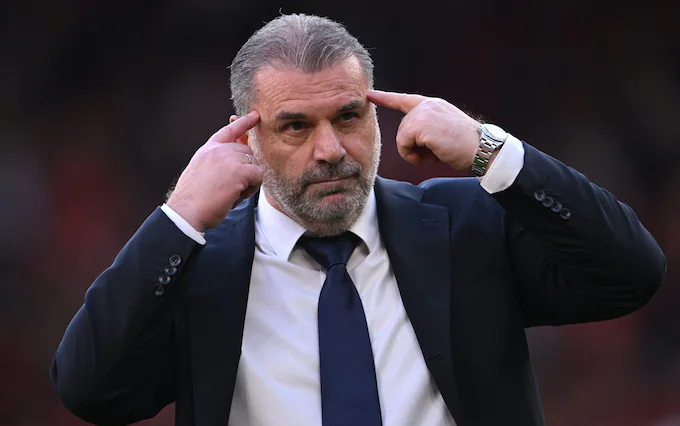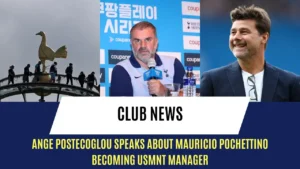
U.S. soccer has entered a new era, both for the men’s and women’s national teams.
The U.S. Women’s National Team, now under the guidance of new coach Emma Hayes, recently claimed gold at the 2024 Paris Olympics, solidifying their status as a dominant force in women’s soccer. Meanwhile, the men’s team has made a bold move by appointing a high-profile manager who will be quite familiar to Tottenham Hotspur fans: Mauricio Pochettino.
The appointment of Pochettino as the head coach of the U.S. Men’s National Team (USMNT) has been met with significant excitement and intrigue. Pochettino, known for his tenure at clubs like Tottenham and PSG, is taking on his first international coaching role, a move that has sparked considerable discussion among fans and pundits alike. One such voice weighing in on the appointment is current Tottenham manager, Ange Postecoglou, who offered his insights on what Pochettino might bring to the U.S. team.
Ange Postecoglou on Mauricio Pochettino’s New Role
During a pre-game press conference ahead of Spurs’ first Premier League fixture against newly-promoted Leicester City, Postecoglou shared his thoughts on Pochettino’s new challenge as the head of the USMNT. He emphasized the unique nature of international football compared to club management, highlighting the different skill sets required and the intensity of the international stage.
“It’s a different job. It’s a different role, different skill set. International football when you’re together, everything’s really intense. The highs are high, the lows are lows because every win means you get closer to doing something special and every loss usually means the end of a tournament,” Postecoglou remarked.
This perspective is particularly relevant given Postecoglou’s own experience in international management. He led Australia’s U17 and U20 teams to multiple trophies and later managed the senior men’s national team, guiding them to an Asian Cup victory in 2015. His understanding of the international game adds weight to his comments, especially when discussing the challenges and opportunities that Pochettino will face.
Postecoglou also acknowledged the potential within the U.S. soccer landscape. “The US, they’re emerging as a nation, and I think they want to take the next step where they can make an impact at a World Cup. There’s definitely talent there, so I’m sure he’ll enjoy it,” he added.
This optimism is reflective of the broader sentiment around U.S. soccer. With the 2026 World Cup set to be hosted in the United States, there is a palpable sense of ambition and expectation. The appointment of Pochettino signals a desire to elevate the men’s team to new heights, particularly after their underwhelming performances in recent tournaments under former coach Gregg Berhalter.

A Familiar Face in a New Role
Pochettino’s appointment as the USMNT coach is not just significant for American soccer but also resonates deeply with Tottenham fans. Pochettino remains a beloved figure at Spurs, where he enjoyed considerable success, guiding the team to consistent top-four finishes in the Premier League and a memorable run to the Champions League final in 2019. However, his subsequent move to Chelsea—where his tenure was short-lived—dampened some of that admiration.
For many Spurs fans, seeing Pochettino take the reins of a national team is akin to watching a familiar hero embark on a new adventure. While there may be mixed feelings about his time at Chelsea, the respect for what he accomplished at Tottenham remains strong. The attachment is somewhat reminiscent of how fans would have felt if Harry Kane had made a controversial move to a rival club.
Eyes on 2026
As Pochettino begins his tenure with the USMNT, the focus will undoubtedly be on how he can shape the team in the lead-up to the 2026 World Cup. Known for his ability to maximize the potential of his squads, as seen during his stints at Southampton and Tottenham, Pochettino faces the challenge of elevating a U.S. team that has struggled to consistently perform at the highest levels.
The pressure to secure silverware, particularly within the CONCACAF region, will be ever-present. However, the appointment of Pochettino suggests that U.S. Soccer is aiming for more than just regional dominance—they’re gearing up for a serious run on the world stage. The 2026 World Cup, co-hosted by the United States, will be the ultimate test of Pochettino’s ability to lead a national team.
As the journey begins, fans and analysts alike will be keenly watching Pochettino’s strategies, player selections, and how he manages the unique pressures of international football. His time at the helm of the USMNT will be a fascinating chapter in his already storied career, and one that could redefine American soccer on the global stage.
Leave a Reply